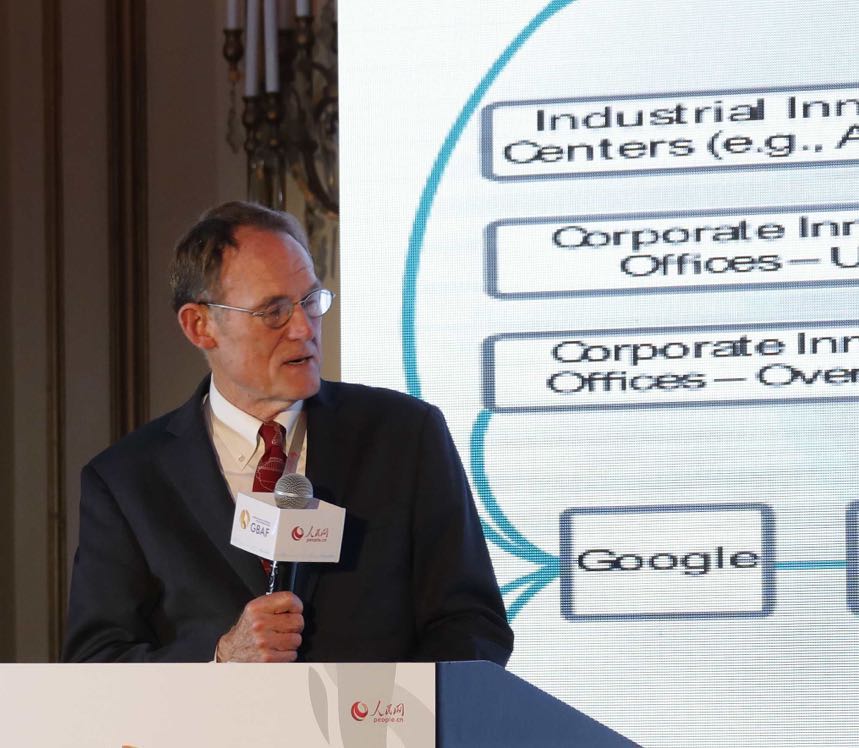

San Francisco, June 24 (People’s Daily Online) -- Closing the door to talent will cost jobs and hurt US competitiveness, Sean Randolph, Senior Director of the Bay Area Council Economic Institute, said on Tuesday.

Sean Randolph
In an exclusive interview with People’s Daily Online west USA, Randolph warned that the Trump administration’s plan to suspend the issuance of H-1B and other temporary visas through the end of 2020 is a direct challenge to the business model that has made Silicon Valley and other U.S. technology centers successful, a model that underpins America’s economic and technological leadership.
Randolph said that Silicon Valley is built on talent, much of it coming from around the world. The ability to attract the best trained and most creative people is a large part of the explanation for why its economy has excelled. While the short-term impacts of this new policy will be limited (the executive order does not apply to visa holders already in the country), restricting flows of talent to the U.S. will come at significant long term cost to competitiveness and to Americans whether or not they work in tech.
The National Foundation for American Policy, after examining data for 91 unicorns (new companies valued at $1 billion or more), found that 50 of them have at least one immigrant founder (the many Bay Area examples include Tesla, Slack and Uber). Their collective value at the time the research was conducted was $248 billion, and on average they had created 1,200 jobs per company, the vast majority in the U.S. Tellingly, 33 of those companies are headquartered in California.
The contributions of innovative immigrants extend beyond founders: 75 of the 91 companies surveyed (82%) had at least one immigrant filling key management or product development roles, the most common being CEO, CTO of Vice President for Engineering.

The Bay Area
Other research carried out by the Marion Ewing Kauffman Foundation finds that immigrants are twice as likely as native born citizens to become entrepreneurs. “We see this in the Bay Area every day, where 40-45% of startups are led by entrepreneurs who came from other countries,” said Randolph.
“The implication is clear,” Randolph said, pointing out that fewer immigrants means fewer startups, and losing those startups means fewer new companies and fewer jobs.
According to Randolph, H-1Bs are used by both tech and non-tech companies to fill jobs where the needed skills are unique or not available locally. The numbers aren’t large but are strategic, he stressed, adding that in many cases, visa holders go on to win green cards or permanent residency, which enables them to contribute to the U.S. economy in the long term.
“So this isn’t just about temporary workers – it’s about innovation and long-term talent flows.”
Randolph listed several other implications for shutting the door: educated immigrants who are denied entry to the U.S. are welcomed by countries with which we compete and may choose to go there instead, or they may choose to stay home to start their own companies. If Silicon Valley or other companies can’t find the skills they need when they need them, he said, the odds increase that more high-skilled jobs and functions will leave the U.S. for other countries such as Canada, which welcomes immigrants and where educated workers with advanced skills are readily available.
Universities that rely heavily on foreign students to fill their graduate departments in fields such as engineering and computer science are also vulnerable if potential applicants believe they have no opportunity to work in the U.S. following graduation.
It has been reported that other visas will also be suspended – H-2Bs for seasonal workers (for example at summer resorts where local workers are in short supply), L visas that apply to intra-company transfers, and J visas that enable work-study summer programs for students. All are forms of legal immigration that fill unmet needs and create opportunity.
“Using the coronavirus as an excuse to pull up the drawbridge will not fill critical needs or create new jobs. It will, on the other hand, undercut the flow of talent that has made America truly great. Businesses and citizens groups should push back,” Randolph noted.
 Fire brigade in Shanghai holds group wedding
Fire brigade in Shanghai holds group wedding Tourists enjoy ice sculptures in Datan Town, north China
Tourists enjoy ice sculptures in Datan Town, north China Sunset scenery of Dayan Pagoda in Xi'an
Sunset scenery of Dayan Pagoda in Xi'an Tourists have fun at scenic spot in Nanlong Town, NW China
Tourists have fun at scenic spot in Nanlong Town, NW China Harbin attracts tourists by making best use of ice in winter
Harbin attracts tourists by making best use of ice in winter In pics: FIS Alpine Ski Women's World Cup Slalom
In pics: FIS Alpine Ski Women's World Cup Slalom Black-necked cranes rest at reservoir in Lhunzhub County, Lhasa
Black-necked cranes rest at reservoir in Lhunzhub County, Lhasa China's FAST telescope will be available to foreign scientists in April
China's FAST telescope will be available to foreign scientists in April "She power" plays indispensable role in poverty alleviation
"She power" plays indispensable role in poverty alleviation Top 10 world news events of People's Daily in 2020
Top 10 world news events of People's Daily in 2020 Top 10 China news events of People's Daily in 2020
Top 10 China news events of People's Daily in 2020 Top 10 media buzzwords of 2020
Top 10 media buzzwords of 2020 Year-ender:10 major tourism stories of 2020
Year-ender:10 major tourism stories of 2020 No interference in Venezuelan issues
No interference in Venezuelan issues
 Biz prepares for trade spat
Biz prepares for trade spat
 Broadcasting Continent
Broadcasting Continent Australia wins Chinese CEOs as US loses
Australia wins Chinese CEOs as US loses